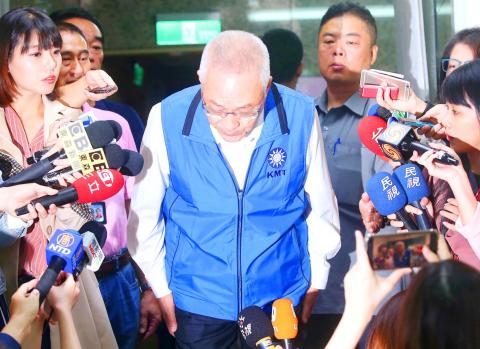Chinese Nationalist Party KMT Chairman Wu Den-yih (吳敦義) yesterday morning apologized for referring to Presidential Office Secretary-General Chen Chu (陳菊) as “a fat sow” and said that although he made an inappropriate comment on Saturday, he longs for clean and honest elections.
Wu made the remark about the former Kaohsiung mayor during an event for KMT Kaohsiung mayoral candidate Han Kuo-yu (韓國瑜).
It was a “non-public event with about 10 or 20 people,” the former vice president and premier, who also served as Kaohsiung mayor from 1990 to 1998, said yesterday.

Photo: CNA
Wu said that he was an old friend of former Examination Yuan member Huang Chun-ying (黃俊英) and that several people at Saturday’s event had come from Huang’s hometown.
He and some of them got emotional when the subject turned to the Kaohsiung mayoral election 12 years ago, when Huang was a candidate, he said.
Huang lost the election due to false rumors of bribery and remained deeply troubled by the allegations until he died, Wu said.
His comment about Chen was “inappropriate,” whether as an “indirect reference to her or description about her,” Wu said as he bowed in front of photographers to Chen and others hurt by his remark.
He asked KMT Vice Secretary-General Cheng Li-wen (鄭麗文) on Saturday to apologize to the public on his behalf, Wu said.
The most important thing is to ensure elections are “clean, honest” and “free of unethical moves,” he said, adding that this is what he deeply longs for and has always believed in throughout his decades-long political career.
Han is also against unethical election efforts, Wu said, referring to Han’s remarks at an event on Saturday that he would rather “lose the election while keeping his integrity than win by cheating.”
There was no need for Han to join him in an apology, because the inappropriate comment was his alone, Wu added.
Asked if his remark could hurt the KMT’s campaign, Wu said it would not, adding that he had apologized for what needed an apology.
Asked why he had not immediately apologized on Saturday, Wu said the first reports on his remark said it was an “insinuation.”
Whether it was a direct comment on Chen was irrelevant to the fact that it was inappropriate, he said.
Wu’s Facebook account was flooded by Han’s supporters demanding that he take responsibility for his remark, and Wu said that he respects their opinions.
He reiterated that he had “apologized for what needed an apology and would insist on what needs to be insisted on.”
At a Democratic Progressive Party rally in Kaohsiung last night, Chen made her first comment on the issue, telling the crowd: “I am a daughter of Taiwanese, I am not a big sow.”

AGING: As of last month, people aged 65 or older accounted for 20.06 percent of the total population and the number of couples who got married fell by 18,685 from 2024 Taiwan has surpassed South Korea as the country least willing to have children, with an annual crude birthrate of 4.62 per 1,000 people, Ministry of the Interior data showed yesterday. The nation was previously ranked the second-lowest country in terms of total fertility rate, or the average number of children a woman has in her lifetime. However, South Korea’s fertility rate began to recover from 2023, with total fertility rate rising from 0.72 and estimated to reach 0.82 to 0.85 by last year, and the crude birthrate projected at 6.7 per 1,000 people. Japan’s crude birthrate was projected to fall below six,

Conflict with Taiwan could leave China with “massive economic disruption, catastrophic military losses, significant social unrest, and devastating sanctions,” a US think tank said in a report released on Monday. The German Marshall Fund released a report titled If China Attacks Taiwan: The Consequences for China of “Minor Conflict” and “Major War” Scenarios. The report details the “massive” economic, military, social and international costs to China in the event of a minor conflict or major war with Taiwan, estimating that the Chinese People’s Liberation Army (PLA) could sustain losses of more than half of its active-duty ground forces, including 100,000 troops. Understanding Chinese

US President Donald Trump in an interview with the New York Times published on Thursday said that “it’s up to” Chinese President Xi Jinping (習近平) what China does on Taiwan, but that he would be “very unhappy” with a change in the “status quo.” “He [Xi] considers it to be a part of China, and that’s up to him what he’s going to be doing, but I’ve expressed to him that I would be very unhappy if he did that, and I don’t think he’ll do that. I hope he doesn’t do that,” Trump said. Trump made the comments in the context

SELF-DEFENSE: Tokyo has accelerated its spending goal and its defense minister said the nation needs to discuss whether it should develop nuclear-powered submarines China is ramping up objections to what it sees as Japan’s desire to acquire nuclear weapons, despite Tokyo’s longstanding renunciation of such arms, deepening another fissure in the two neighbors’ increasingly tense ties. In what appears to be a concerted effort, China’s foreign and defense ministries issued statements on Thursday condemning alleged remilitarism efforts by Tokyo. The remarks came as two of the country’s top think tanks jointly issued a 29-page report framing actions by “right-wing forces” in Japan as posing a “serious threat” to world peace. While that report did not define “right-wing forces,” the Chinese Ministry of Foreign Affairs was